Attending Physician Resume Examples

Jul 18, 2024
|
12 min read
Crafting a winning attending physician resume: diagnose your career path with expert tips to help you stand out.
Rated by 348 people
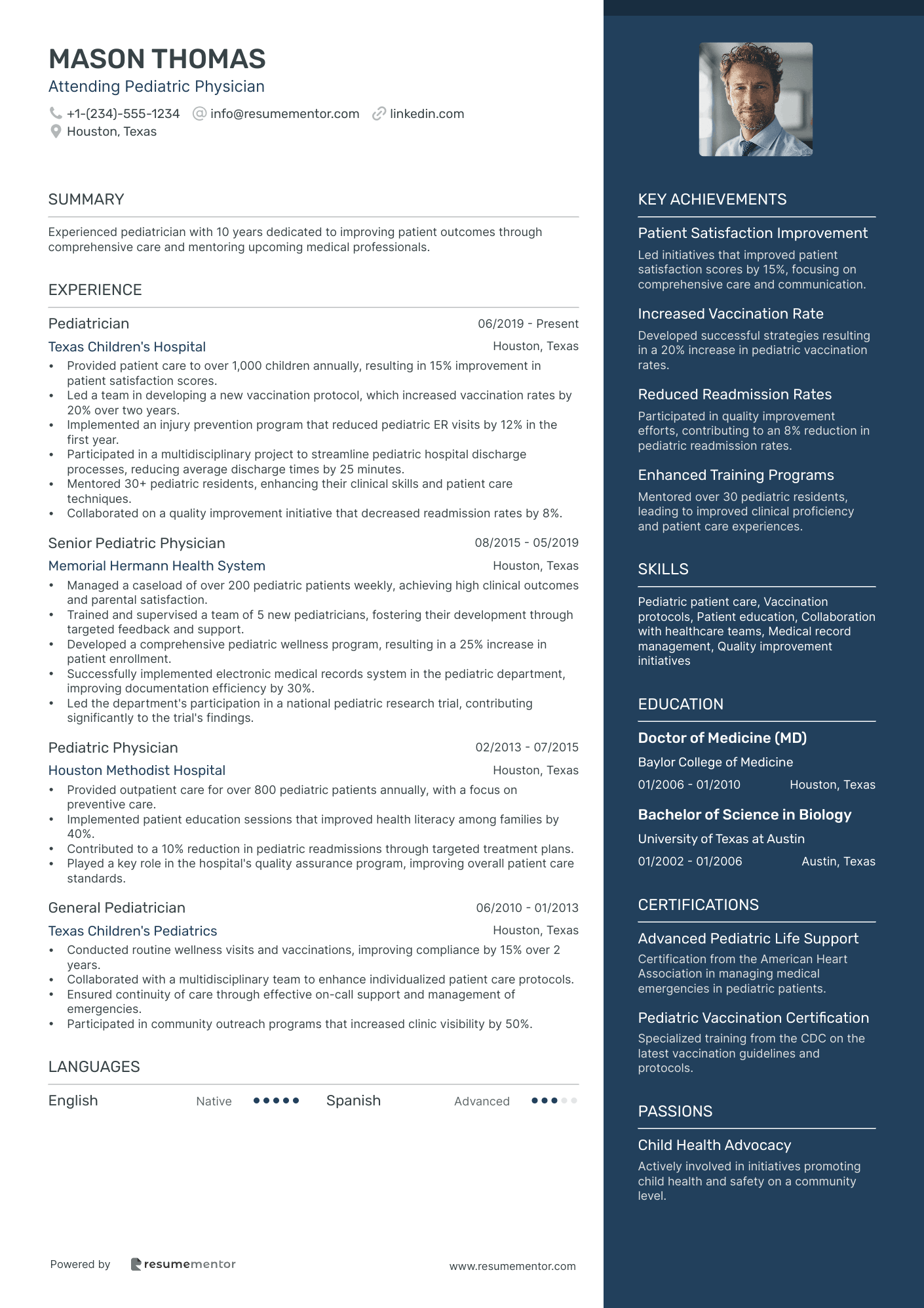
Attending Pediatric Physician
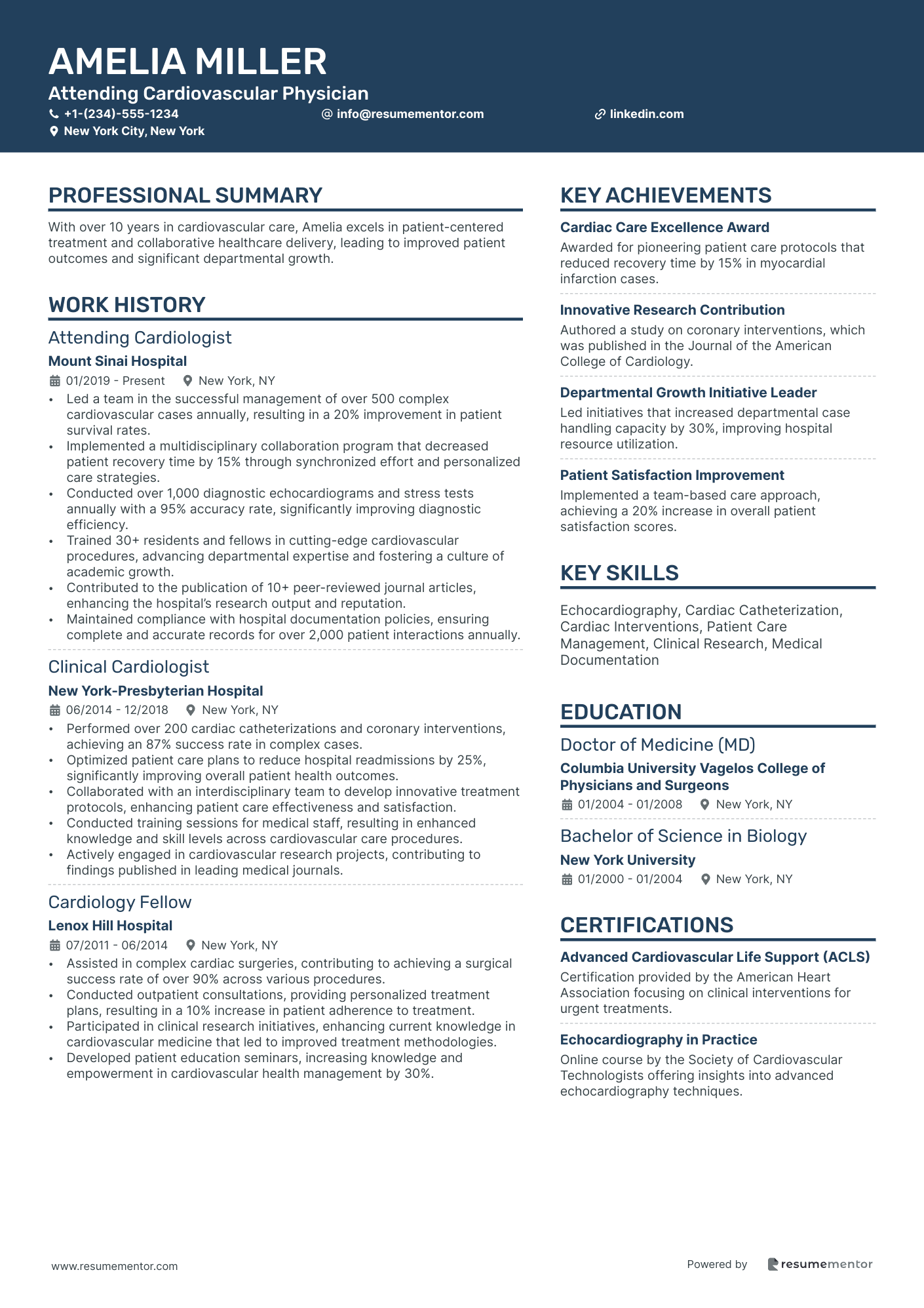
Attending Cardiovascular Physician
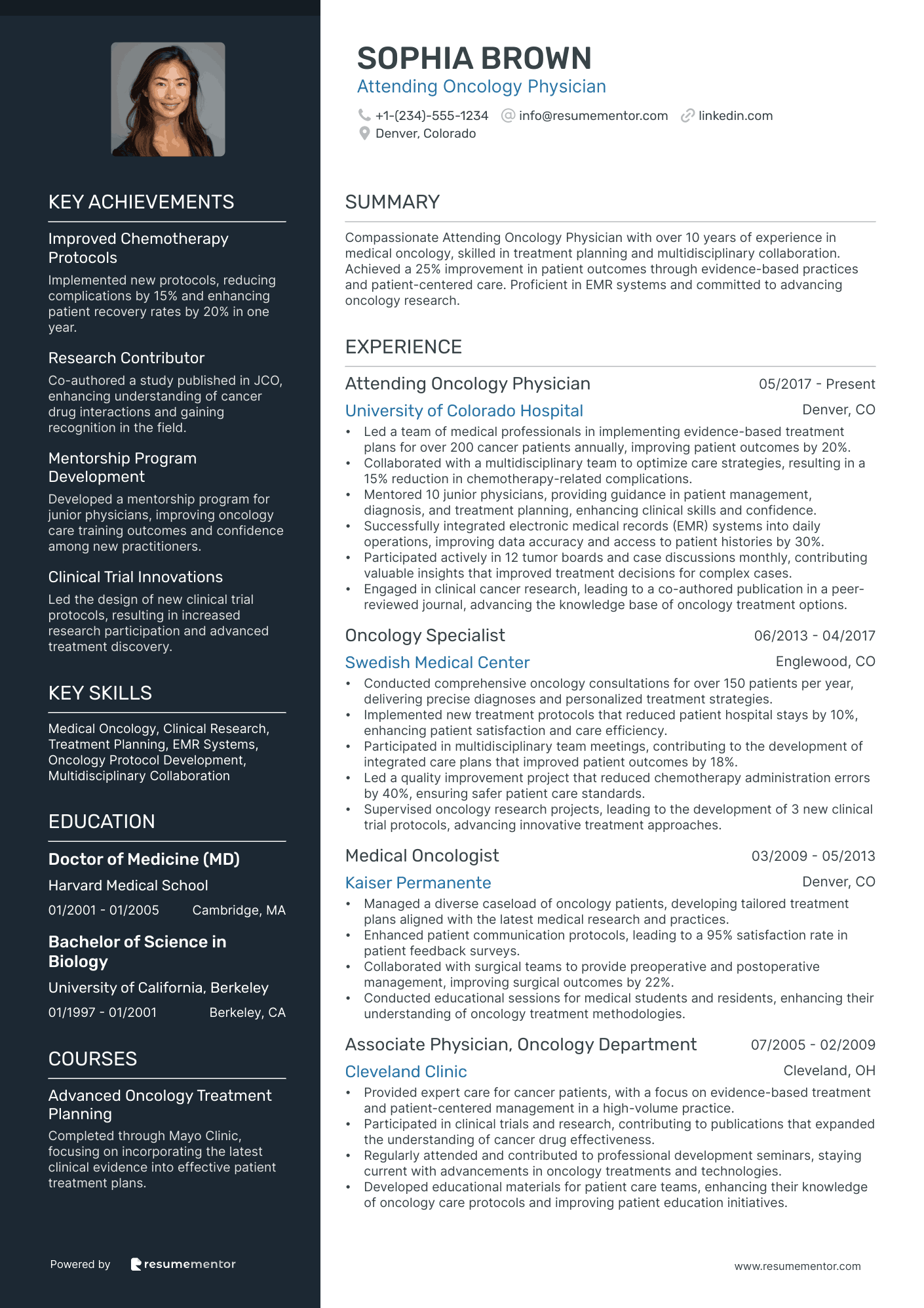
Attending Oncology Physician
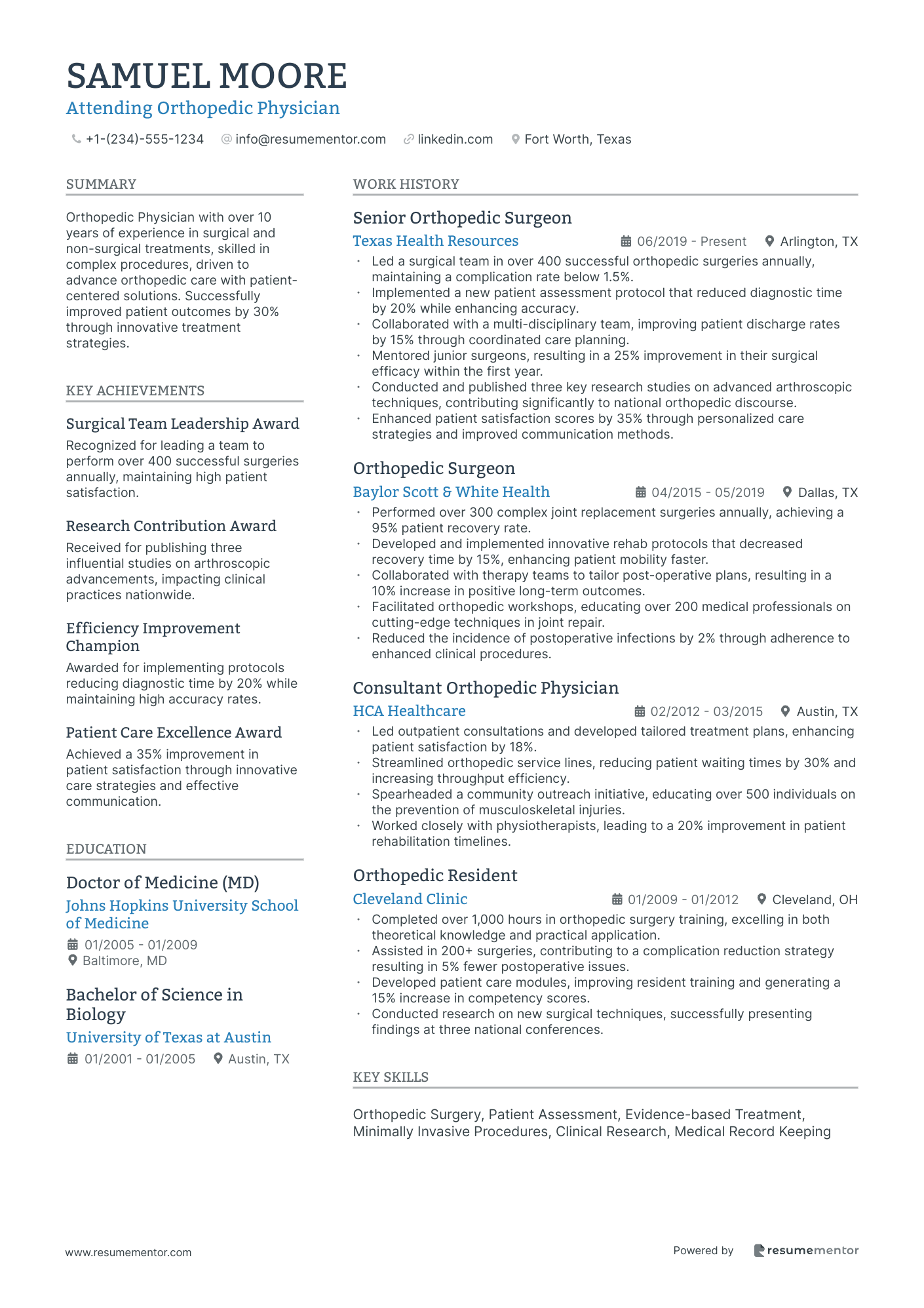
Attending Orthopedic Physician
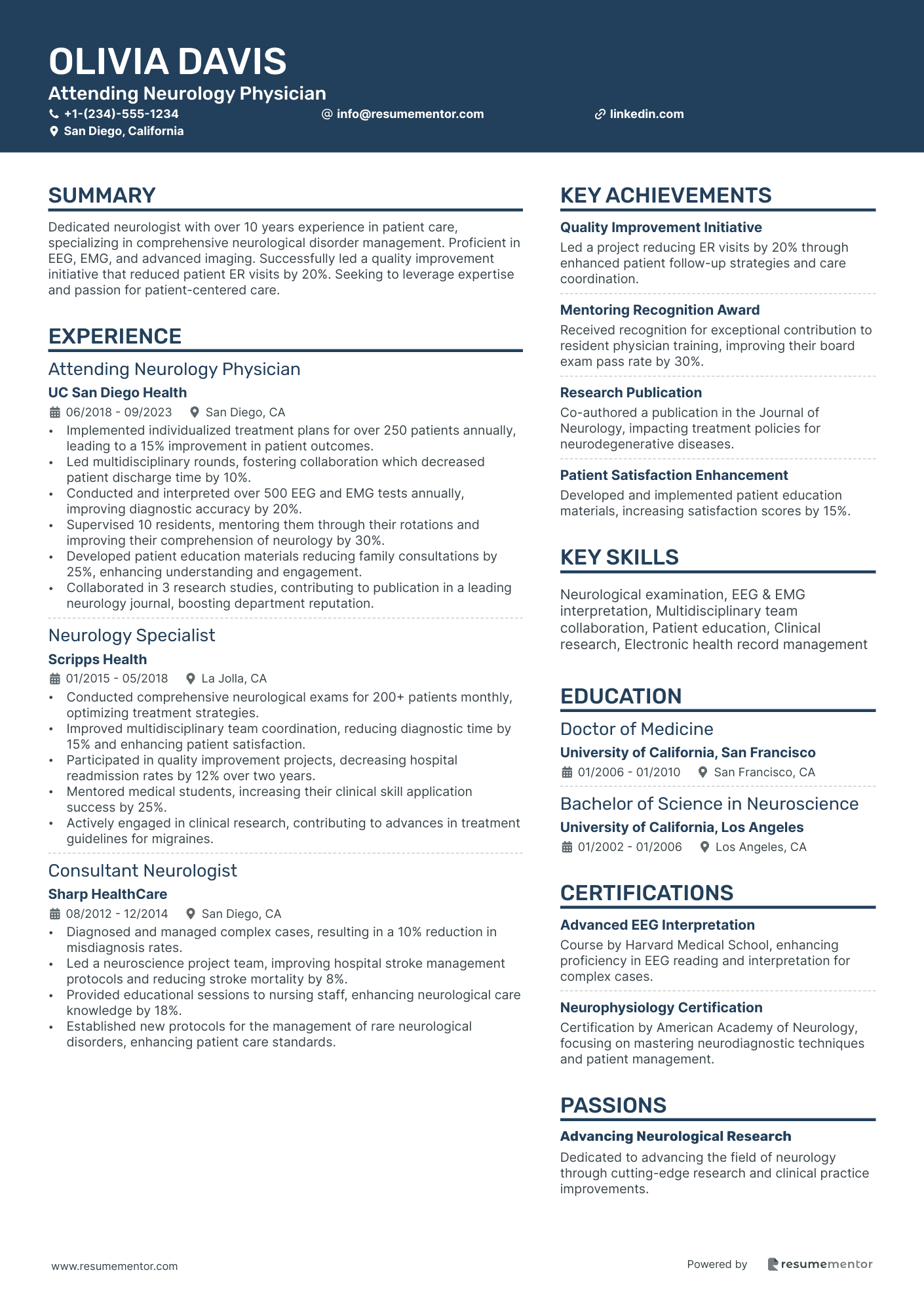
Attending Neurology Physician
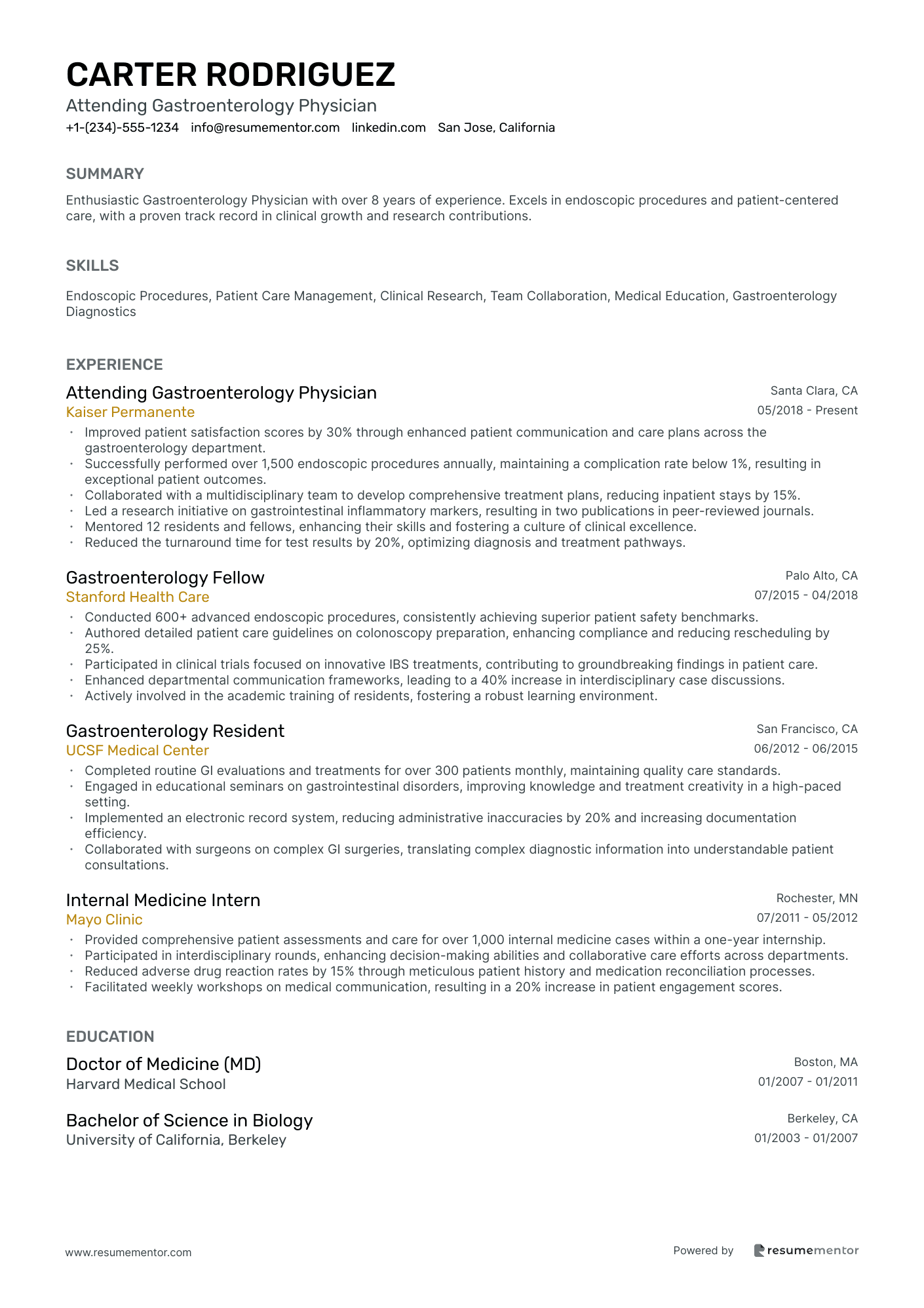
Attending Gastroenterology Physician
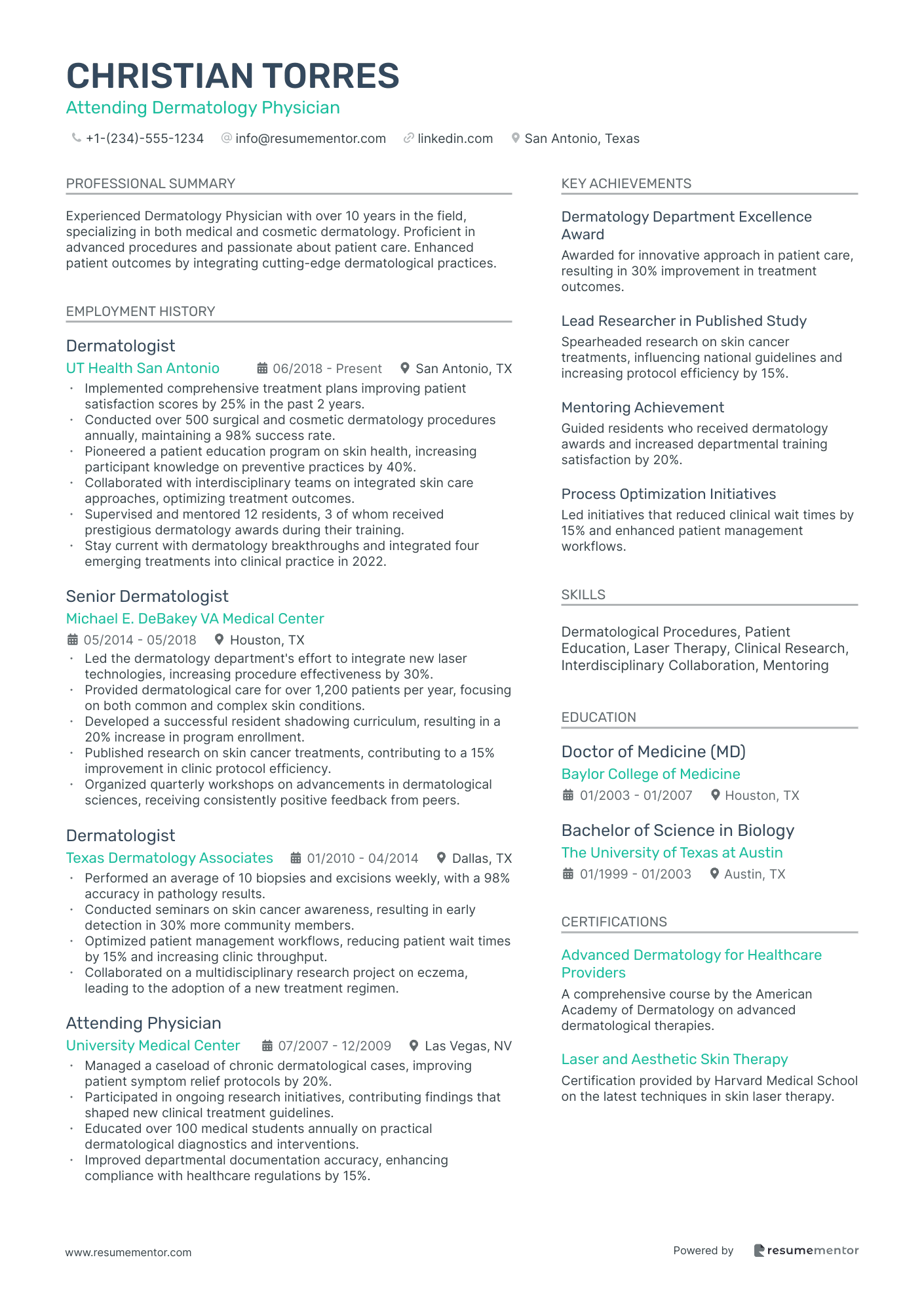
Attending Dermatology Physician
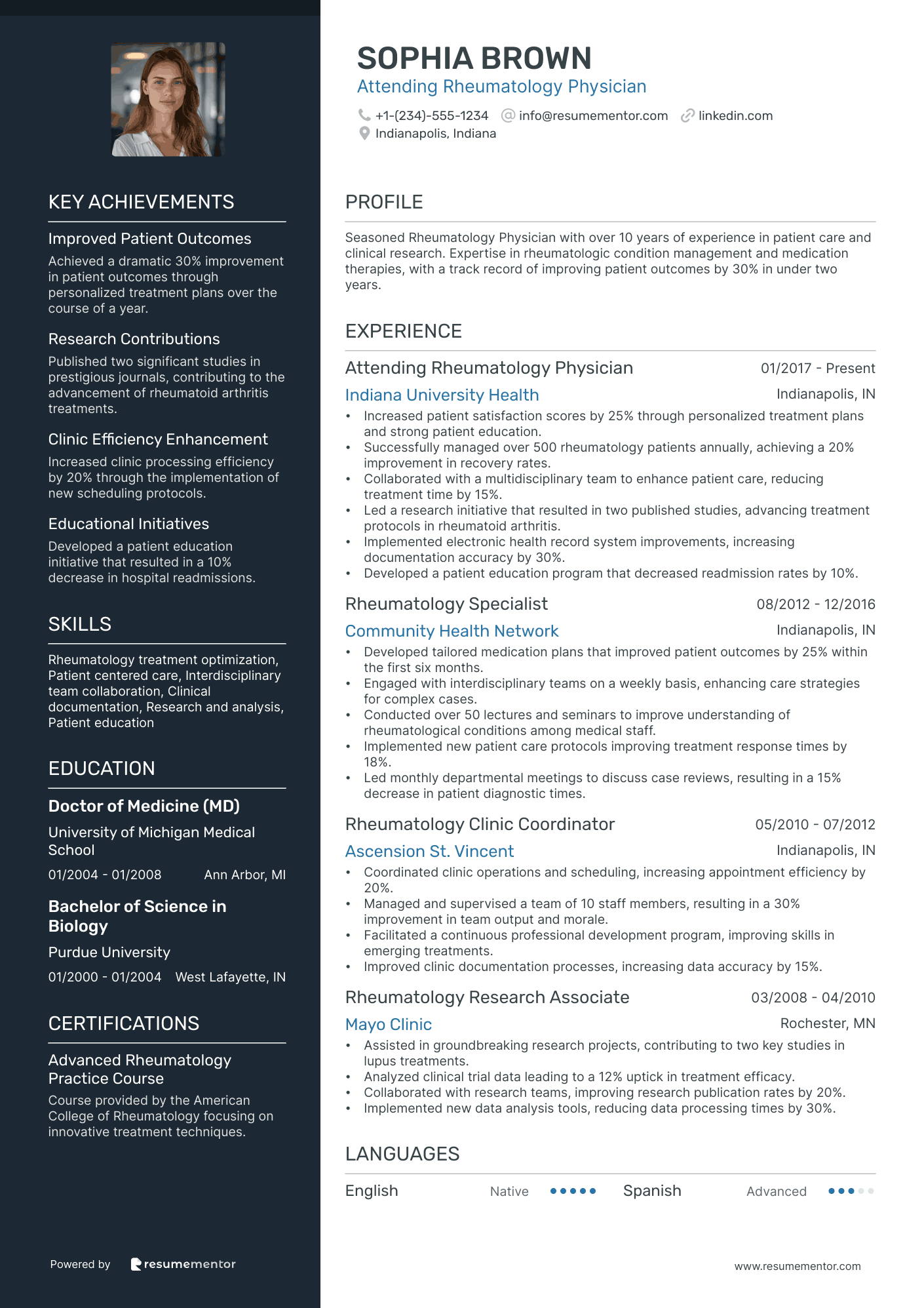
Attending Rheumatology Physician
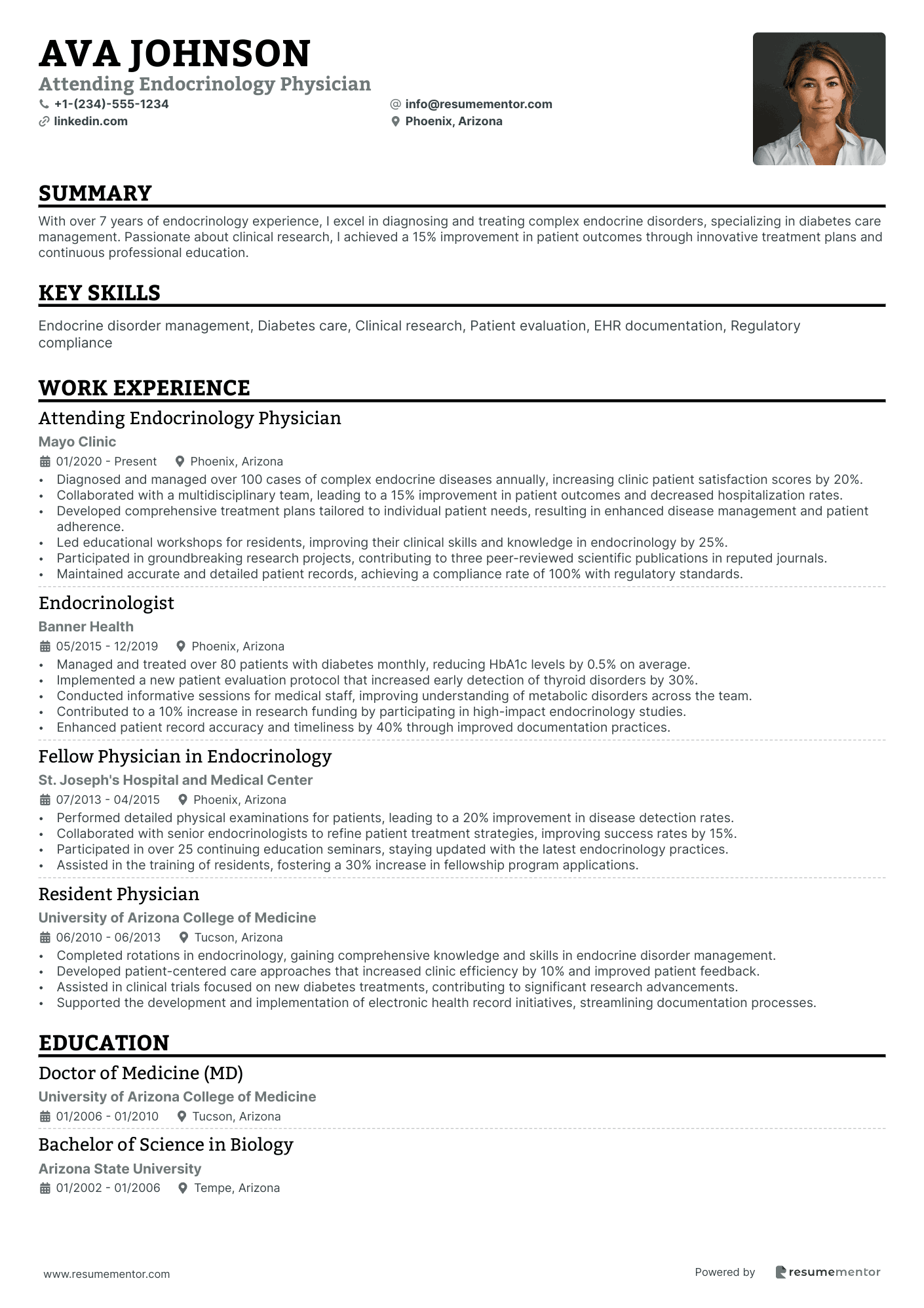
Attending Endocrinology Physician
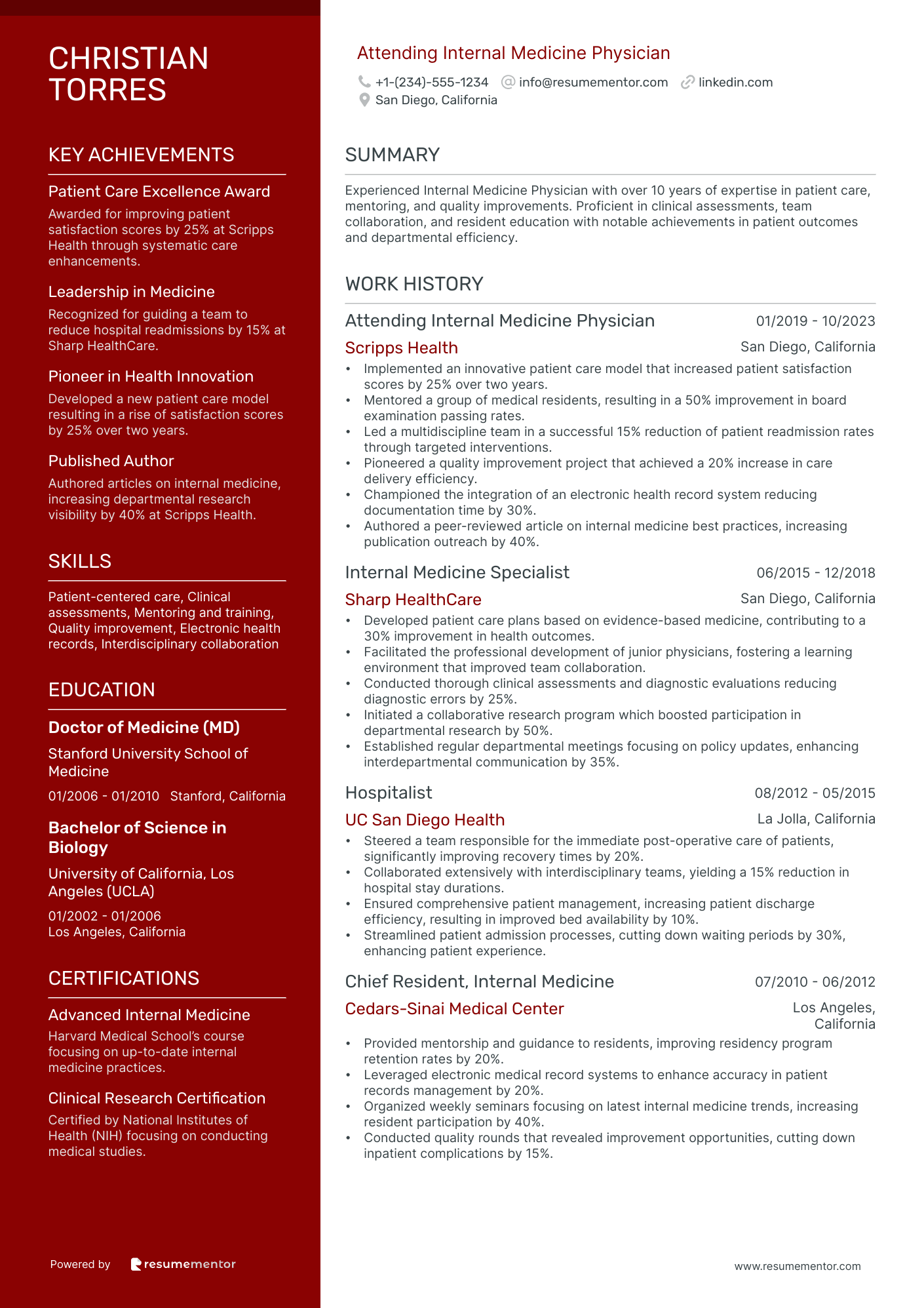
Attending Internal Medicine Physician

Attending Pediatric Physician resume sample
- •Provided patient care to over 1,000 children annually, resulting in 15% improvement in patient satisfaction scores.
- •Led a team in developing a new vaccination protocol, which increased vaccination rates by 20% over two years.
- •Implemented an injury prevention program that reduced pediatric ER visits by 12% in the first year.
- •Participated in a multidisciplinary project to streamline pediatric hospital discharge processes, reducing average discharge times by 25 minutes.
- •Mentored 30+ pediatric residents, enhancing their clinical skills and patient care techniques.
- •Collaborated on a quality improvement initiative that decreased readmission rates by 8%.
- •Managed a caseload of over 200 pediatric patients weekly, achieving high clinical outcomes and parental satisfaction.
- •Trained and supervised a team of 5 new pediatricians, fostering their development through targeted feedback and support.
- •Developed a comprehensive pediatric wellness program, resulting in a 25% increase in patient enrollment.
- •Successfully implemented electronic medical records system in the pediatric department, improving documentation efficiency by 30%.
- •Led the department's participation in a national pediatric research trial, contributing significantly to the trial's findings.
- •Provided outpatient care for over 800 pediatric patients annually, with a focus on preventive care.
- •Implemented patient education sessions that improved health literacy among families by 40%.
- •Contributed to a 10% reduction in pediatric readmissions through targeted treatment plans.
- •Played a key role in the hospital's quality assurance program, improving overall patient care standards.
- •Conducted routine wellness visits and vaccinations, improving compliance by 15% over 2 years.
- •Collaborated with a multidisciplinary team to enhance individualized patient care protocols.
- •Ensured continuity of care through effective on-call support and management of emergencies.
- •Participated in community outreach programs that increased clinic visibility by 50%.
Attending Cardiovascular Physician resume sample
- •Led a team in the successful management of over 500 complex cardiovascular cases annually, resulting in a 20% improvement in patient survival rates.
- •Implemented a multidisciplinary collaboration program that decreased patient recovery time by 15% through synchronized effort and personalized care strategies.
- •Conducted over 1,000 diagnostic echocardiograms and stress tests annually with a 95% accuracy rate, significantly improving diagnostic efficiency.
- •Trained 30+ residents and fellows in cutting-edge cardiovascular procedures, advancing departmental expertise and fostering a culture of academic growth.
- •Contributed to the publication of 10+ peer-reviewed journal articles, enhancing the hospital’s research output and reputation.
- •Maintained compliance with hospital documentation policies, ensuring complete and accurate records for over 2,000 patient interactions annually.
- •Performed over 200 cardiac catheterizations and coronary interventions, achieving an 87% success rate in complex cases.
- •Optimized patient care plans to reduce hospital readmissions by 25%, significantly improving overall patient health outcomes.
- •Collaborated with an interdisciplinary team to develop innovative treatment protocols, enhancing patient care effectiveness and satisfaction.
- •Conducted training sessions for medical staff, resulting in enhanced knowledge and skill levels across cardiovascular care procedures.
- •Actively engaged in cardiovascular research projects, contributing to findings published in leading medical journals.
- •Assisted in complex cardiac surgeries, contributing to achieving a surgical success rate of over 90% across various procedures.
- •Conducted outpatient consultations, providing personalized treatment plans, resulting in a 10% increase in patient adherence to treatment.
- •Participated in clinical research initiatives, enhancing current knowledge in cardiovascular medicine that led to improved treatment methodologies.
- •Developed patient education seminars, increasing knowledge and empowerment in cardiovascular health management by 30%.
- •Completed over 2,500 patient consultations, significantly contributing to hospital’s patient care capabilities.
- •Supported senior physicians in managing complex cases, ensuring high standards of patient care and achieving a resident satisfaction rate of 95%.
- •Implemented methods that reduced patient waiting times by 15%, enhancing patient satisfaction and perception of care.
- •Actively participated in department-wide quality improvement initiatives, driving innovation and efficiency in patient diagnostics.
Attending Oncology Physician resume sample
- •Led a team of medical professionals in implementing evidence-based treatment plans for over 200 cancer patients annually, improving patient outcomes by 20%.
- •Collaborated with a multidisciplinary team to optimize care strategies, resulting in a 15% reduction in chemotherapy-related complications.
- •Mentored 10 junior physicians, providing guidance in patient management, diagnosis, and treatment planning, enhancing clinical skills and confidence.
- •Successfully integrated electronic medical records (EMR) systems into daily operations, improving data accuracy and access to patient histories by 30%.
- •Participated actively in 12 tumor boards and case discussions monthly, contributing valuable insights that improved treatment decisions for complex cases.
- •Engaged in clinical cancer research, leading to a co-authored publication in a peer-reviewed journal, advancing the knowledge base of oncology treatment options.
- •Conducted comprehensive oncology consultations for over 150 patients per year, delivering precise diagnoses and personalized treatment strategies.
- •Implemented new treatment protocols that reduced patient hospital stays by 10%, enhancing patient satisfaction and care efficiency.
- •Participated in multidisciplinary team meetings, contributing to the development of integrated care plans that improved patient outcomes by 18%.
- •Led a quality improvement project that reduced chemotherapy administration errors by 40%, ensuring safer patient care standards.
- •Supervised oncology research projects, leading to the development of 3 new clinical trial protocols, advancing innovative treatment approaches.
- •Managed a diverse caseload of oncology patients, developing tailored treatment plans aligned with the latest medical research and practices.
- •Enhanced patient communication protocols, leading to a 95% satisfaction rate in patient feedback surveys.
- •Collaborated with surgical teams to provide preoperative and postoperative management, improving surgical outcomes by 22%.
- •Conducted educational sessions for medical students and residents, enhancing their understanding of oncology treatment methodologies.
- •Provided expert care for cancer patients, with a focus on evidence-based treatment and patient-centered management in a high-volume practice.
- •Participated in clinical trials and research, contributing to publications that expanded the understanding of cancer drug effectiveness.
- •Regularly attended and contributed to professional development seminars, staying current with advancements in oncology treatments and technologies.
- •Developed educational materials for patient care teams, enhancing their knowledge of oncology care protocols and improving patient education initiatives.
Attending Orthopedic Physician resume sample
- •Led a surgical team in over 400 successful orthopedic surgeries annually, maintaining a complication rate below 1.5%.
- •Implemented a new patient assessment protocol that reduced diagnostic time by 20% while enhancing accuracy.
- •Collaborated with a multi-disciplinary team, improving patient discharge rates by 15% through coordinated care planning.
- •Mentored junior surgeons, resulting in a 25% improvement in their surgical efficacy within the first year.
- •Conducted and published three key research studies on advanced arthroscopic techniques, contributing significantly to national orthopedic discourse.
- •Enhanced patient satisfaction scores by 35% through personalized care strategies and improved communication methods.
- •Performed over 300 complex joint replacement surgeries annually, achieving a 95% patient recovery rate.
- •Developed and implemented innovative rehab protocols that decreased recovery time by 15%, enhancing patient mobility faster.
- •Collaborated with therapy teams to tailor post-operative plans, resulting in a 10% increase in positive long-term outcomes.
- •Facilitated orthopedic workshops, educating over 200 medical professionals on cutting-edge techniques in joint repair.
- •Reduced the incidence of postoperative infections by 2% through adherence to enhanced clinical procedures.
- •Led outpatient consultations and developed tailored treatment plans, enhancing patient satisfaction by 18%.
- •Streamlined orthopedic service lines, reducing patient waiting times by 30% and increasing throughput efficiency.
- •Spearheaded a community outreach initiative, educating over 500 individuals on the prevention of musculoskeletal injuries.
- •Worked closely with physiotherapists, leading to a 20% improvement in patient rehabilitation timelines.
- •Completed over 1,000 hours in orthopedic surgery training, excelling in both theoretical knowledge and practical application.
- •Assisted in 200+ surgeries, contributing to a complication reduction strategy resulting in 5% fewer postoperative issues.
- •Developed patient care modules, improving resident training and generating a 15% increase in competency scores.
- •Conducted research on new surgical techniques, successfully presenting findings at three national conferences.
Attending Neurology Physician resume sample
- •Implemented individualized treatment plans for over 250 patients annually, leading to a 15% improvement in patient outcomes.
- •Led multidisciplinary rounds, fostering collaboration which decreased patient discharge time by 10%.
- •Conducted and interpreted over 500 EEG and EMG tests annually, improving diagnostic accuracy by 20%.
- •Supervised 10 residents, mentoring them through their rotations and improving their comprehension of neurology by 30%.
- •Developed patient education materials reducing family consultations by 25%, enhancing understanding and engagement.
- •Collaborated in 3 research studies, contributing to publication in a leading neurology journal, boosting department reputation.
- •Conducted comprehensive neurological exams for 200+ patients monthly, optimizing treatment strategies.
- •Improved multidisciplinary team coordination, reducing diagnostic time by 15% and enhancing patient satisfaction.
- •Participated in quality improvement projects, decreasing hospital readmission rates by 12% over two years.
- •Mentored medical students, increasing their clinical skill application success by 25%.
- •Actively engaged in clinical research, contributing to advances in treatment guidelines for migraines.
- •Diagnosed and managed complex cases, resulting in a 10% reduction in misdiagnosis rates.
- •Led a neuroscience project team, improving hospital stroke management protocols and reducing stroke mortality by 8%.
- •Provided educational sessions to nursing staff, enhancing neurological care knowledge by 18%.
- •Established new protocols for the management of rare neurological disorders, enhancing patient care standards.
- •Performed diagnostic tests, successfully improving early detection rates of neurological disorders by 20%.
- •Led patient care initiatives, resulting in a 15% improvement in patient satisfaction scores.
- •Collaborated with cross-functional medical teams, enhancing patient care coordination and reducing treatment delays.
- •Provided mentorship to junior doctors, increasing departmental retention rates by 10%.
Attending Gastroenterology Physician resume sample
- •Improved patient satisfaction scores by 30% through enhanced patient communication and care plans across the gastroenterology department.
- •Successfully performed over 1,500 endoscopic procedures annually, maintaining a complication rate below 1%, resulting in exceptional patient outcomes.
- •Collaborated with a multidisciplinary team to develop comprehensive treatment plans, reducing inpatient stays by 15%.
- •Led a research initiative on gastrointestinal inflammatory markers, resulting in two publications in peer-reviewed journals.
- •Mentored 12 residents and fellows, enhancing their skills and fostering a culture of clinical excellence.
- •Reduced the turnaround time for test results by 20%, optimizing diagnosis and treatment pathways.
- •Conducted 600+ advanced endoscopic procedures, consistently achieving superior patient safety benchmarks.
- •Authored detailed patient care guidelines on colonoscopy preparation, enhancing compliance and reducing rescheduling by 25%.
- •Participated in clinical trials focused on innovative IBS treatments, contributing to groundbreaking findings in patient care.
- •Enhanced departmental communication frameworks, leading to a 40% increase in interdisciplinary case discussions.
- •Actively involved in the academic training of residents, fostering a robust learning environment.
- •Completed routine GI evaluations and treatments for over 300 patients monthly, maintaining quality care standards.
- •Engaged in educational seminars on gastrointestinal disorders, improving knowledge and treatment creativity in a high-paced setting.
- •Implemented an electronic record system, reducing administrative inaccuracies by 20% and increasing documentation efficiency.
- •Collaborated with surgeons on complex GI surgeries, translating complex diagnostic information into understandable patient consultations.
- •Provided comprehensive patient assessments and care for over 1,000 internal medicine cases within a one-year internship.
- •Participated in interdisciplinary rounds, enhancing decision-making abilities and collaborative care efforts across departments.
- •Reduced adverse drug reaction rates by 15% through meticulous patient history and medication reconciliation processes.
- •Facilitated weekly workshops on medical communication, resulting in a 20% increase in patient engagement scores.
Attending Dermatology Physician resume sample
- •Implemented comprehensive treatment plans improving patient satisfaction scores by 25% in the past 2 years.
- •Conducted over 500 surgical and cosmetic dermatology procedures annually, maintaining a 98% success rate.
- •Pioneered a patient education program on skin health, increasing participant knowledge on preventive practices by 40%.
- •Collaborated with interdisciplinary teams on integrated skin care approaches, optimizing treatment outcomes.
- •Supervised and mentored 12 residents, 3 of whom received prestigious dermatology awards during their training.
- •Stay current with dermatology breakthroughs and integrated four emerging treatments into clinical practice in 2022.
- •Led the dermatology department's effort to integrate new laser technologies, increasing procedure effectiveness by 30%.
- •Provided dermatological care for over 1,200 patients per year, focusing on both common and complex skin conditions.
- •Developed a successful resident shadowing curriculum, resulting in a 20% increase in program enrollment.
- •Published research on skin cancer treatments, contributing to a 15% improvement in clinic protocol efficiency.
- •Organized quarterly workshops on advancements in dermatological sciences, receiving consistently positive feedback from peers.
- •Performed an average of 10 biopsies and excisions weekly, with a 98% accuracy in pathology results.
- •Conducted seminars on skin cancer awareness, resulting in early detection in 30% more community members.
- •Optimized patient management workflows, reducing patient wait times by 15% and increasing clinic throughput.
- •Collaborated on a multidisciplinary research project on eczema, leading to the adoption of a new treatment regimen.
- •Managed a caseload of chronic dermatological cases, improving patient symptom relief protocols by 20%.
- •Participated in ongoing research initiatives, contributing findings that shaped new clinical treatment guidelines.
- •Educated over 100 medical students annually on practical dermatological diagnostics and interventions.
- •Improved departmental documentation accuracy, enhancing compliance with healthcare regulations by 15%.
Attending Rheumatology Physician resume sample
- •Increased patient satisfaction scores by 25% through personalized treatment plans and strong patient education.
- •Successfully managed over 500 rheumatology patients annually, achieving a 20% improvement in recovery rates.
- •Collaborated with a multidisciplinary team to enhance patient care, reducing treatment time by 15%.
- •Led a research initiative that resulted in two published studies, advancing treatment protocols in rheumatoid arthritis.
- •Implemented electronic health record system improvements, increasing documentation accuracy by 30%.
- •Developed a patient education program that decreased readmission rates by 10%.
- •Developed tailored medication plans that improved patient outcomes by 25% within the first six months.
- •Engaged with interdisciplinary teams on a weekly basis, enhancing care strategies for complex cases.
- •Conducted over 50 lectures and seminars to improve understanding of rheumatological conditions among medical staff.
- •Implemented new patient care protocols improving treatment response times by 18%.
- •Led monthly departmental meetings to discuss case reviews, resulting in a 15% decrease in patient diagnostic times.
- •Coordinated clinic operations and scheduling, increasing appointment efficiency by 20%.
- •Managed and supervised a team of 10 staff members, resulting in a 30% improvement in team output and morale.
- •Facilitated a continuous professional development program, improving skills in emerging treatments.
- •Improved clinic documentation processes, increasing data accuracy by 15%.
- •Assisted in groundbreaking research projects, contributing to two key studies in lupus treatments.
- •Analyzed clinical trial data leading to a 12% uptick in treatment efficacy.
- •Collaborated with research teams, improving research publication rates by 20%.
- •Implemented new data analysis tools, reducing data processing times by 30%.
Attending Endocrinology Physician resume sample
- •Diagnosed and managed over 100 cases of complex endocrine diseases annually, increasing clinic patient satisfaction scores by 20%.
- •Collaborated with a multidisciplinary team, leading to a 15% improvement in patient outcomes and decreased hospitalization rates.
- •Developed comprehensive treatment plans tailored to individual patient needs, resulting in enhanced disease management and patient adherence.
- •Led educational workshops for residents, improving their clinical skills and knowledge in endocrinology by 25%.
- •Participated in groundbreaking research projects, contributing to three peer-reviewed scientific publications in reputed journals.
- •Maintained accurate and detailed patient records, achieving a compliance rate of 100% with regulatory standards.
- •Managed and treated over 80 patients with diabetes monthly, reducing HbA1c levels by 0.5% on average.
- •Implemented a new patient evaluation protocol that increased early detection of thyroid disorders by 30%.
- •Conducted informative sessions for medical staff, improving understanding of metabolic disorders across the team.
- •Contributed to a 10% increase in research funding by participating in high-impact endocrinology studies.
- •Enhanced patient record accuracy and timeliness by 40% through improved documentation practices.
- •Performed detailed physical examinations for patients, leading to a 20% improvement in disease detection rates.
- •Collaborated with senior endocrinologists to refine patient treatment strategies, improving success rates by 15%.
- •Participated in over 25 continuing education seminars, staying updated with the latest endocrinology practices.
- •Assisted in the training of residents, fostering a 30% increase in fellowship program applications.
- •Completed rotations in endocrinology, gaining comprehensive knowledge and skills in endocrine disorder management.
- •Developed patient-centered care approaches that increased clinic efficiency by 10% and improved patient feedback.
- •Assisted in clinical trials focused on new diabetes treatments, contributing to significant research advancements.
- •Supported the development and implementation of electronic health record initiatives, streamlining documentation processes.
Attending Internal Medicine Physician resume sample
- •Implemented an innovative patient care model that increased patient satisfaction scores by 25% over two years.
- •Mentored a group of medical residents, resulting in a 50% improvement in board examination passing rates.
- •Led a multidiscipline team in a successful 15% reduction of patient readmission rates through targeted interventions.
- •Pioneered a quality improvement project that achieved a 20% increase in care delivery efficiency.
- •Championed the integration of an electronic health record system reducing documentation time by 30%.
- •Authored a peer-reviewed article on internal medicine best practices, increasing publication outreach by 40%.
- •Developed patient care plans based on evidence-based medicine, contributing to a 30% improvement in health outcomes.
- •Facilitated the professional development of junior physicians, fostering a learning environment that improved team collaboration.
- •Conducted thorough clinical assessments and diagnostic evaluations reducing diagnostic errors by 25%.
- •Initiated a collaborative research program which boosted participation in departmental research by 50%.
- •Established regular departmental meetings focusing on policy updates, enhancing interdepartmental communication by 35%.
- •Steered a team responsible for the immediate post-operative care of patients, significantly improving recovery times by 20%.
- •Collaborated extensively with interdisciplinary teams, yielding a 15% reduction in hospital stay durations.
- •Ensured comprehensive patient management, increasing patient discharge efficiency, resulting in improved bed availability by 10%.
- •Streamlined patient admission processes, cutting down waiting periods by 30%, enhancing patient experience.
- •Provided mentorship and guidance to residents, improving residency program retention rates by 20%.
- •Leveraged electronic medical record systems to enhance accuracy in patient records management by 20%.
- •Organized weekly seminars focusing on latest internal medicine trends, increasing resident participation by 40%.
- •Conducted quality rounds that revealed improvement opportunities, cutting down inpatient complications by 15%.
Navigating the job market as an attending physician can feel like performing a delicate surgery, with your resume as your professional blueprint. You face unique challenges in crafting this document: balancing your medical expertise with leadership skills isn’t always straightforward.
Turning years of advanced patient care and complex decision-making into simple, impactful language can be daunting. This is even more challenging when competing with equally qualified colleagues. When formatting isn’t your main strength, a well-designed resume template can be a game-changer, providing clarity and professionalism.
A reliable template helps your achievements shine, allowing you to concentrate on content rather than format. This ensures your medical experience and accomplishments are effectively highlighted, making your story compelling.
With the right approach, your resume becomes more than a list of qualifications; it transforms into a narrative that captures your career’s value. This guide is here to aid that transformation, helping you open doors to new career opportunities.
Key Takeaways
- Crafting a standout attending physician resume involves blending medical expertise with leadership skills, making it vital to use a well-designed resume template.
- An attending physician resume should focus on conveying medical expertise and leadership abilities, reflecting a commitment to patient care and medical excellence.
- Choosing a reverse-chronological format emphasizes recent and relevant roles, ensuring a clear trajectory of experience and growth.
- A strong experience section should highlight achievements, using action words and quantifiable results to demonstrate leadership and problem-solving abilities.
- Incorporating relevant education, certifications, and skills effectively demonstrates qualifications, while optional sections like language, hobbies, and volunteer work provide additional insight into the professional and personal aspects of a candidate.
What to focus on when writing your attending physician resume
An attending physician resume should seamlessly convey your medical expertise and leadership skills, emphasizing your ability to deliver exceptional patient care. This document should weave together your journey in diagnosing, treating, and managing patient care while reflecting your commitment to medical excellence and continuous learning.
How to structure your attending physician resume
- Contact Information: Begin with your full name, phone number, email, and LinkedIn profile. Accurate and up-to-date contact information is crucial as it ensures easy access for recruiters looking to connect with you about potential opportunities. It's the foundation for initiating communication and should never be overlooked.
- Professional Summary: This section provides a snapshot of your career, presenting a concise overview of your clinical experience, areas of expertise, and key accomplishments. By highlighting how your leadership in medical teams has led to improved patient outcomes, you set the tone for the rest of your resume, showing recruiters your potential impact from the very start.
- Medical Experience: As you detail your roles, responsibilities, and successes in various medical settings, connect these experiences to your skills in patient diagnosis, developing treatment plans, and performing specialized procedures. This section should paint a picture of your hands-on experience and contributions to improving medical practices, illustrating your value to potential employers.
- Education: Listing your medical degree, institution's name, and graduation year provides a robust academic foundation. Including relevant certifications and additional training enhances your specialization. This section connects your educational achievements with your role as a leader in medicine, forming a bridge from your academic pursuits to your career accomplishments.
- Licenses and Certifications: Clearly outline all relevant medical licenses and certifications, ensuring they are current, to display your qualifications to practice medicine legally and professionally. Mentioning significant professional affiliations demonstrates your active engagement in the medical community, reinforcing your commitment to staying informed and involved in ongoing developments within the field.
Additionally, sections like "Research and Publications" or "Awards and Honors" can further illuminate your contributions and achievements in the field. Below, we'll delve deeper into each section to guide you more thoroughly in crafting a standout resume.
Which resume format to choose
Creating a standout attending physician resume involves several important elements that work together to create a compelling portrait of your professional journey. Start with the reverse-chronological format, which is ideal for showcasing your most recent and relevant roles. This format is crucial in the medical field, where demonstrating a clear trajectory of experience and growth is key.
Choosing the right font can subtly enhance the overall professionalism of your resume. Consider modern options like Rubik, Montserrat, or Lato. These fonts are not just about aesthetics; they help make your text easier to read, which is important when capturing an employer’s attention quickly.
When it comes to file types, always save your resume as a PDF. This ensures that no matter which device or operating system is used to open your resume, it will look exactly how you intended, with all formatting intact. This consistency is important in maintaining a polished and professional appearance.
Lastly, don’t overlook the importance of setting your margins. Keeping them at about one inch all around prevents your content from feeling cramped, making it easier for potential employers to focus on what matters most—your skills and experience. By aligning these elements, you’ll craft a resume that effectively represents your capabilities as an attending physician.
How to write a quantifiable resume experience section
An attending physician resume should feature an experience section that truly stands out. Concentrate on your achievements in patient care, leadership, and teamwork in healthcare settings. Keep the structure straightforward with job titles, workplace names, and dates, which help employers quickly grasp your work history and skills. Listing the most recent job first ensures that your current expertise is prominent. While it's useful to include experience from the past 10 to 15 years, your newer roles often hold the most relevance to the attending physician position. Ensure you include job titles that align with what an attending physician does.
Tailoring your resume is crucial; align your responsibilities with those highlighted in the job ad, using similar language to catch the hiring manager’s attention. Action words like "led," "developed," "implemented," and "enhanced" convey your proactive approach. These words signal your ability to innovate and lead within healthcare environments.
- •Led a team of 10 residents, increasing patient satisfaction scores by 25% over two years.
- •Developed a new patient care protocol, reducing the average length of stay by 15%.
- •Implemented a telehealth program used by over 500 patients monthly, improving accessibility.
- •Enhanced interdisciplinary collaboration, resulting in a 20% decrease in readmission rates.
This experience section stands out by weaving together clear, quantifiable achievements that reflect your impact as an attending physician. Each action word—like "led," "developed," and "implemented"—is strategically chosen to demonstrate your leadership and problem-solving capabilities. By clearly structuring your accomplishments and responsibilities, you connect your past roles to the skills required for future ones. Tailoring your entries to match typical job ad requirements not only makes your resume relevant but also compelling to employers. The measurable results, such as boosting patient satisfaction and decreasing readmission rates, provide concrete proof of your skills and promise of future success, reassuring hiring managers of your potential.
Problem-Solving Focused resume experience section
A problem-solving focused attending physician resume experience section should effectively demonstrate how you tackle challenges in a clinical environment. Begin by showcasing real-life examples where you've taken initiative to overcome difficult medical cases or enhanced patient care processes. Highlight your critical thinking skills and your ability to work collaboratively with a medical team to achieve the best health outcomes. Include measurable results that illustrate the positive impact of your efforts to underscore your contributions.
Organize your achievements with bullet points to clearly communicate your successes and experiences. Start each point with a strong action verb that showcases your problem-solving capabilities. Highlight any innovative methods you've implemented or systems you've developed to improve care delivery. Provide quantifiable data like improved patient satisfaction scores or reduced recovery times to give a concrete sense of your success. Maintain straightforward language and ensure each bullet point connects back to demonstrating your problem-solving skills and accomplishments.
Attending Physician
City Hospital
June 2018 - Present
- Led a multidisciplinary team to develop a new protocol that reduced patient recovery time by 20%.
- Implemented an electronic alert system to identify high-risk patients, improving early intervention rates by 15%.
- Collaborated with nursing staff to streamline discharge processes, boosting patient satisfaction scores by 25 points.
- Presented challenging case solutions at quarterly staff meetings, facilitating knowledge sharing and promoting teamwork.
Project-Focused resume experience section
A project-focused attending physician resume experience section should effectively spotlight your direct contributions and the impact of your projects. Begin with naming each project and its objective, clearly detailing your role and how you drove or supported these initiatives. Elaborate on the skills you utilized, any challenges you faced, and the successful methods employed. Highlighting the results, especially with specific numbers, demonstrates your achievements and underscores your ability to make a difference.
Using bullet points is an effective way to succinctly communicate your achievements, with each point illustrating a different facet of your involvement. Use clear and precise language that naturally flows to emphasize the impact of your actions, quickly conveying your contributions and the value you added to past projects. By focusing on tangible, measurable outcomes, you can effectively showcase your competence and confidence, ensuring that your experience truly stands out.
Attending Physician
City Hospital
Jan 2019 - Present
- Led a multidisciplinary team to develop a new patient management protocol, resulting in a 20% increase in positive patient outcomes.
- Implemented an electronic health records (EHR) integration project to streamline patient data access, reducing average appointment time by 15 minutes.
- Conducted extensive research to support evidence-based practice improvements, which lowered readmission rates by 12%.
- Organized regular training sessions for junior staff, enhancing their skills and reducing error rates in the department by 30%.
Responsibility-Focused resume experience section
A responsibility-focused attending physician resume experience section should start by clearly stating your position and the workplace, using straightforward language to outline your key duties and achievements. Highlighting your clinical, supervisory, and administrative roles is essential for providing a comprehensive picture of your abilities and experience. By selecting examples and language that truly reflect the responsibilities you've undertaken, you show both the breadth and depth of your professional journey.
In the bullet points, describe specific achievements or tasks that demonstrate your responsibilities in a clear and engaging way. Use active verbs to highlight your contributions, focusing on measurable results that emphasize your impact. Whether it's managing patient loads, improving healthcare processes, or fostering successful team collaborations, the aim is to showcase the responsibilities you handled and the positive outcomes you achieved, which supported your patients and enriched your team.
Attending Physician
Metropolitan General Hospital
June 2015 - Present
- Led a multidisciplinary team to deliver high-quality healthcare to over 1500 patients annually.
- Improved patient recovery rates by 20% after implementing a new postoperative care protocol.
- Conducted regular training sessions for medical staff, enhancing the overall skill level of the team.
- Streamlined patient intake processes, reducing wait times by an average of 15 minutes per session.
Result-Focused resume experience section
A result-focused attending physician resume experience section should effectively showcase your achievements and the impact you've made in your roles. Begin by stating your job title, workplace, and the dates you held each position, setting the stage for your accomplishments. In the bullet points, focus on the tangible outcomes you've achieved, such as enhancing patient care or improving hospital processes. Use action verbs and provide specific metrics wherever possible to illustrate your success, like elevating patient satisfaction or reducing wait times.
By aligning the narrative with your skills and their direct contribution to success, you create a cohesive story of your professional journey. Instead of listing generic tasks, emphasize significant areas where your efforts brought meaningful improvements. Featuring numbers and percentages helps highlight the scale of your contributions, making it clear to potential employers how your work leads to substantial progress and success.
Attending Physician
City Hospital
2017 - Present
- Improved patient satisfaction scores by 25% through enhanced care plans.
- Introduced an electronic health record system, reducing patient wait times by 30%.
- Led a multidisciplinary team that decreased hospital readmission rates by 15% within a year.
- Mentored junior doctors, boosting their clinical skills and confidence in patient care decisions.
Write your attending physician resume summary section
A patient-focused attending physician resume summary should spotlight your experience, skills, and achievements in a way that flows naturally and cohesively. Begin with your years of experience, areas of specialization, and core competencies to create a strong foundation. This approach allows you to effectively highlight what sets you apart in the medical field. For seasoned professionals, this section is ideal for underscoring career accomplishments and contributions to healthcare improvement. Incorporating quantifiable achievements ensures that potential employers see tangible evidence of your success, like this example:
This summary seamlessly integrates specialization, leadership, and quantifiable success, painting a comprehensive picture of your expertise. A well-crafted summary stands apart from other resume sections like objectives, profiles, and qualifications by focusing on what you bring rather than what you seek to achieve. While an objective shows your career aspirations, a profile offers a broader look at your skills, occasionally overlapping with a summary. A list of qualifications delves into specific achievements in more detail, often used in bullet points. Selecting the right format helps ensure you communicate your strengths effectively and aligns with how a potential employer envisions the ideal candidate.
Listing your attending physician skills on your resume
A skills-focused attending physician resume should seamlessly integrate skills throughout the document. Presenting your skills as a standalone section or weaving them into your experience and summary can highlight your capabilities effectively. Emphasizing strengths and soft skills is crucial because they showcase your ability to collaborate and manage diverse scenarios. Meanwhile, hard skills, such as medical techniques, diagnostic skills, and proficiency with medical tools, are specific, teachable abilities.
Incorporating your skills and strengths strategically across your resume can turn them into powerful keywords. These keywords not only capture the attention of employers but also help your resume pass through Automated Tracking Systems (ATS), making you a standout candidate for the position.
Here’s an example of a standalone skills section using a JSON format:
The effectiveness of this skills section lies in its focus on skills vital to an attending physician. Each skill represents an important aspect of medical practice, from patient care to technology use, demonstrating your readiness to handle the role's demands.
Best hard skills to feature on your attending physician resume
Hard skills are the backbone of an attending physician’s professional expertise. You should highlight these skills to show your medical proficiency and technical ability, ensuring you’re prepared for complex procedures and patient care coordination.
Hard Skills
- Medical Diagnosis
- Surgical Procedures
- Emergency Medicine
- Critical Care
- Patient Assessment
- Advanced Cardiac Life Support (ACLS)
- Pediatric Care
- Pharmacology
- Radiology Interpretation
- Anesthesiology
- Internal Medicine
- Telemedicine
- Oncology Treatments
- Allergy and Immunology
- Geriatric Medicine
Best soft skills to feature on your attending physician resume
Equally important, soft skills display your interpersonal strengths and leadership qualities. These skills illustrate your capability to effectively communicate with patients and healthcare teams, manage conflict, and navigate challenging situations with ease.
Soft Skills
- Communication
- Empathy
- Problem Solving
- Leadership
- Teamwork
- Patient Advocacy
- Adaptability
- Conflict Resolution
- Emotional Intelligence
- Time Management
- Cultural Competence
- Decision Making
- Attention to Detail
- Stress Management
- Active Listening
How to include your education on your resume
The education section on your attending physician resume plays a crucial role, highlighting your qualifications and aligning them with the job you're seeking. Tailor this section to include only relevant education that showcases your medical expertise. Avoid listing unrelated education, as it can distract from your career goals. Including your GPA is optional, but if it's impressive, you can format it as 3.8/4.0. Any honors like "cum laude" should be included next to your degree, such as "Doctor of Medicine, cum laude." Present your degree clearly, for example: "Doctor of Medicine."
Here’s a poor example of an education section for an attending physician resume:
This example doesn't relate to the medical field and includes a lower GPA, making it irrelevant for a physician role. Now, consider this well-crafted education section:
This example effectively aligns with an attending physician role, showcasing a prestigious institution and honors like "cum laude." It highlights a strong GPA, giving an edge in competitiveness. Listing relevant details can significantly enhance your resume's impact.
How to include attending physician certificates on your resume
Including a certificates section on your attending physician resume is essential. It showcases your qualifications and specialties to potential employers. Start by listing the name of each certificate. Include the date you received it. Add the issuing organization. This information can also go in the header. For example:
A good certificates section has clear and relevant information. It should include certificates related to the job. For an attending physician, this might include "Board Certification in Internal Medicine" from the American Board of Internal Medicine. This example is effective because it is specific and directly related to your field. Employers can quickly see your qualifications. Keep it brief and to the point for maximum impact.
Extra sections to include in your attending physician resume
Creating a resume as an attending physician requires thoughtfulness in highlighting your qualifications and making them stand out. While your medical education and clinical experience are primary, including well-rounded sections can give a deeper insight into who you are as a professional and person.
Language section — List languages you speak fluently to show your capability to communicate with diverse patients and colleagues.
Hobbies and interests section — Share hobbies and interests to give a glimpse into your personality outside of the professional setting and indicate skills like teamwork and dedication.
Volunteer work section — Detail volunteer work to show your commitment to giving back to the community, which can be appealing to potential employers.
Books section — Include books you have authored or co-authored to demonstrate your expertise and contributions to medical literature.
In Conclusion
In conclusion, navigating the job market as an attending physician demands a tailored resume that accurately reflects your unique blend of skills and experiences. Your resume is more than a list of qualifications; it’s a narrative of your career and its impact. By strategically emphasizing your medical expertise, leadership abilities, and personal achievements, you craft a document that stands out to potential employers. Utilizing modern resume formats and tools can enhance this presentation, ensuring that your professional journey is displayed clearly and effectively. Furthermore, weaving in key sections like certifications, languages, and even hobbies provides a more well-rounded picture of who you are as both a medical professional and an individual. The integration of quantifiable outcomes and specific skills throughout your resume demonstrates your tangible contributions to the field and highlights your potential for future success. Remember, a resume isn't just for securing a job; it’s an opportunity to showcase the exceptional value you bring to the healthcare community. By presenting a polished and comprehensive resume, you open doors to exciting new opportunities in your career, setting the stage for continued growth and achievement. Ultimately, your resume should not only attract the attention of hiring managers but also confidently express your commitment to excellence in the medical field.
Related Articles

Continue Reading
Check more recommended readings to get the job of your dreams.
Resume
Resources
Tools
© 2026. All rights reserved.
Made with love by people who care.

